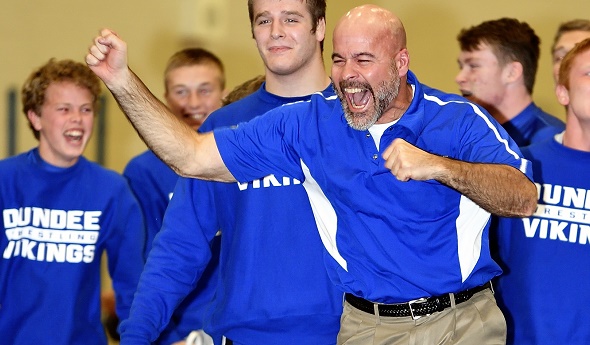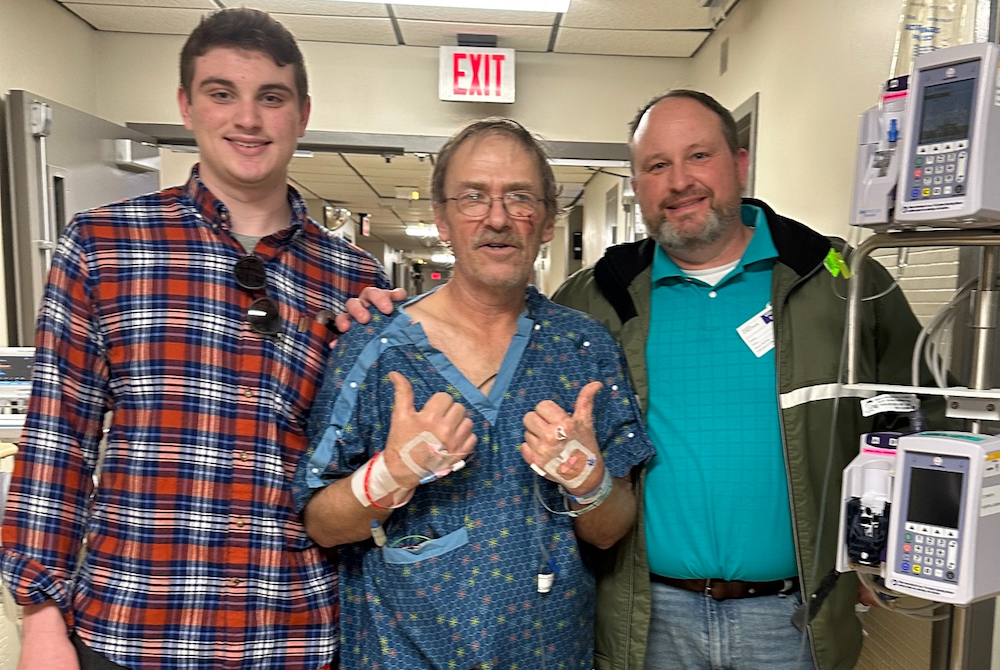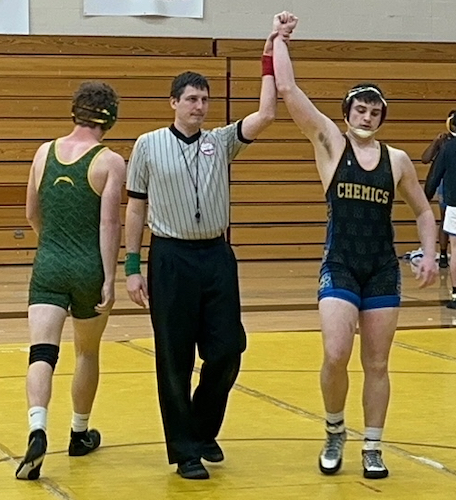
Roberts Drives Dundee to Chase Dream
January 8, 2019
By Doug Donnelly
Special for Second Half
DUNDEE – The thing that keeps Dundee wrestling coach Tim Roberts motivated isn’t another dual meet victory, matching up with state powerhouse Hudson in a conference meet or hanging another banner inside the Vikings’ gymnasium.
 Those things are nice, but what keeps Roberts going in his 20th season as the Dundee head coach is a certain two-time MHSAA Finals-qualifying wrestler from the mid-1980s who won 120 matches for Dundee but ultimately fell short of his goals.
Those things are nice, but what keeps Roberts going in his 20th season as the Dundee head coach is a certain two-time MHSAA Finals-qualifying wrestler from the mid-1980s who won 120 matches for Dundee but ultimately fell short of his goals.
That wrestler was Roberts.
“I’m always trying to prove myself, and I’m always trying to get better,” Roberts said. “When I think of myself as that kid who didn’t place at state, I do much better because I keep that hunger and desire. I need to learn more. I’ve got to get better at this.”
Roberts is already pretty good at what he does – a hall of famer, says Hudson coach Scott Marry, a seven-time MHSAA championship-winning coach himself.
“Coach Roberts is one of the best coaches I’ve ever coached against,” Marry said. “He gets his kids ready mentally and physically. You better have your team ready if you’re going to wrestle Dundee.”
Earlier this season, Roberts reached a career milestone – 500 career wins. He’s led Dundee to six Finals titles and six runner-up finishes, 19 District and 18 Regional titles. He’s coached 32 Individual Finals championship wrestlers and more than 140 all-staters. Under his leadership, Dundee also is approaching 20 Lenawee County Athletic Association titles.
The numbers don’t tell the full story about Roberts, however.
“I could write a book about Tim and how great a coach he is,” said Dundee athletic director Tom Oestrike. “His coaching profile speaks for itself, but what is even more impressive are the type of young men he has helped build in his career – men of selflessness, character and discipline.”
When Roberts wrestled at Dundee, he was a 98-pound freshman who grew to compete in the 126-pound weight class as a senior.
“We were a solid program at the time, (but) winning state was an impossible dream back then for sure,” Roberts said.
“I wasn’t bad at wrestling. I was pretty good. Compared to the guys we have now – I wasn’t as good as them. I thought I was pretty good, but I didn’t accomplish the goals that I wanted to.”
After high school, he enlisted in the Army. It was during that time that he got the coaching bug. He realized he wanted to help young student athletes learn how to get the most out of their careers.
“When I was in the military, I learned a lot about building myself into something and I wanted to share that information,” he said. “I thought about wrestling a lot and how I really didn’t accomplish the goals that I would have liked to, and I wanted to help other people. I had this desire to try to help. I felt like I had a knack for it.”
After his first year as an assistant coach, Dundee changed wrestling head coaches and Jim Wittibslager got the job. Roberts asked him if he could stay on as an assistant.
Wittibslager is a hall of fame coach in his own right. He compiled a record of 333-36-3 in two stints as the Dundee head coach. The Vikings won four straight MHSAA Finals titles during his tenure, from 1995-98.
“We went from a team 4-21 with zero state qualifiers, and by the fifth year we were state champs with 14 state qualifiers,” Roberts said. “It was quite a building process. It was lot of fun to go through and learn. Winning state went from an impossible dream to something that ‘Oh yeah, we could do this.’ We built ourselves into that level.”
Coaching with Wittibslager was a career-changer for Roberts.
“That was crucial in my development in how to coach,” he said. “I thought I had a knack for helping people and I had a little talent in that area, but I learned so much about what it takes, the work ethic and how to win and how to think like a winner.”
Admittedly, Roberts isn’t the same coach he was two decades ago. The sport has evolved significantly.
“I don’t coach now like I did 20 years ago, I’ll say that,” he said. “You grow with the times or you get left behind.”
What hasn’t changed during that time is Roberts’ attention to detail, his passion for coaching the right technique and getting his team ready for meets. Practices now include time in the weight room, warming up with some gymnastics moves such as back handstands, leaps and cartwheels; and, of course, technique.
“We still do conditioning,” he said. “We do quite a bit of that.”
Roberts believes one thing that sets wrestlers apart from each other is how far they can push themselves on the mat – when they reach the point where they feel they don’t have any more strength or ability, they find it.
“The only way you know if you can (push yourself) is by getting (to that point). That, as much as anything, will win you matches,” he said.
Maintaining that success has never been easy. Dundee typically has about 20 wrestlers out each year, a comparably low number to some other high-level programs. But that is where Roberts does his best work. Coaching at the high school level, he said, isn’t about coaching extraordinary athletes – it’s about coaching the average ones.
“It’s been an endless process for 20 years to keep trying to get better at this,” he said. “Average people are who you are coaching. That’s what coaching high school is, I think, learning how to work with the average person. Then, once in a while, you get to work with the exceptional person and that’s fun.”
Despite the enormous success during his 20 seasons at Dundee, Roberts has experienced the same highs and lows as any other coach.
“Lots of highs and lows,” he said. “Lots of times of feeling great, then you get humbled. Then you start feeling great again and then humbled again.”
Roberts coached Dundee to a Division 4 championship in 2001 and Division 3 titles in 2007, 2013, 2014, 2016 and 2018. Last year’s team was ranked nationally and had 14 Individual Finals qualifiers.
“Every one of those (championships) is like the best day of my life,” Roberts said. “Every time. It’s such a great feeling in the end that it all came together, and everything did work, and you did get it all done. A lot of things have to go right. It’s not easy.”
Roberts, 50, isn’t planning on stepping away from coaching any time soon. He’s also not stopping to think about reaching 500 career wins any time soon. He’d rather think about that high school wrestler who missed out on winning a state championship – but has had a remarkable impact on so many others.
“That’s for when you are done (coaching),” he said. “Right now, I’m still trying to get better and trying to work on my weaknesses as a coach and always seeking out how I can be better at this. When you’re done is when you get to reflect.”
 Doug Donnelly has served as a sports and news reporter and city editor over 25 years, writing for the Daily Chief-Union in Upper Sandusky, Ohio from 1992-1995, the Monroe Evening News from 1995-2012 and the Adrian Daily Telegram since 2013. He's also written a book on high school basketball in Monroe County and compiles record books for various schools in southeast Michigan. E-mail him at [email protected] with story ideas for Jackson, Washtenaw, Hillsdale, Lenawee and Monroe counties.
Doug Donnelly has served as a sports and news reporter and city editor over 25 years, writing for the Daily Chief-Union in Upper Sandusky, Ohio from 1992-1995, the Monroe Evening News from 1995-2012 and the Adrian Daily Telegram since 2013. He's also written a book on high school basketball in Monroe County and compiles record books for various schools in southeast Michigan. E-mail him at [email protected] with story ideas for Jackson, Washtenaw, Hillsdale, Lenawee and Monroe counties.
PHOTO: Dundee wrestling coach Tim Roberts and his team celebrate one of the many successful moments during his two decades leading the program. (Photo by David Schankin.)

Midland Heroes Win 'Match of Life' In Saving Another On Way to Regional
By
Paul Costanzo
Special for MHSAA.com
February 22, 2023
Wilson Shinske woke up Saturday hoping to accomplish something great.
 But the Midland senior had no idea just how great and impactful his accomplishment would be, and that it would happen well before he stepped on a wrestling mat.
But the Midland senior had no idea just how great and impactful his accomplishment would be, and that it would happen well before he stepped on a wrestling mat.
On the way to the Division 1 Wrestling Regional at Hartland, Shinske and his dad, Steve, pulled a man from a burning vehicle on I-75 and helped resuscitate him on the side of the road. As the man was taken by ambulance to a local hospital, the Shinskes got back in their own vehicle and made it to the meet in time for weigh-ins.
“The entire way there, I was thinking, ‘It doesn’t matter if I lose or if I win today, this was a win,’” Wilson Shinske said. “Being on the wrestling team is about being part of something bigger than yourself. Yeah, I lost both of my matches, and it was like that journey has ended. But knowing what I did earlier, I won the match of life.”
Shinske finished his wrestling season with a 21-11 record after dropping his pair of Regional matches at 215 pounds. While all of that was certainly important to him, and the end of any senior season can be tough, the events of Saturday morning put a lot of things in perspective.
“I can tell you that I was proud as hell of him,” Steve Shinske said. “I was super proud of how he handled the morning. I was proud – I’m always proud of him when he does a sport, even when he thinks he doesn’t do well. When he lost, I saw him take those losses on Saturday differently than he had in the past in some of those situations. I think he had a different mindset. After he lost the second match, he went over and sat by a wall, and there were some tears shed. There were a ton of emotions, and not just wrestling emotions.”
Wilson Shinske’s day had started like hundreds of wrestlers around the state, as he left Midland around 5:30 a.m. focused on advancing to the MHSAA Individual Finals at Ford Field.
He fell asleep during the ride, but when the car started to slow down well before he thought it should, he knew something was off.
After coming over the Zilwaukee Bridge, Steve Shinske noticed a car fire ahead. As they approached, the retired Midland fireman decided he would stop and see how he could help, figuring he would see someone outside of the vehicle.
 What he saw, however, was the driver slumped over in the front seat of the pickup truck. He pulled to the side of the road, and as he made his way to the truck, so did Wilson, who had now woken up from his pre-meet nap.
What he saw, however, was the driver slumped over in the front seat of the pickup truck. He pulled to the side of the road, and as he made his way to the truck, so did Wilson, who had now woken up from his pre-meet nap.
“It was 75 at 6 a.m. on a Saturday with no traffic; there’s no way we should be slowing down,” Wilson remembered. “As soon as he put it in park, not even a second later, I’m out of the car.”
As the Shinskes got to the vehicle, Steve noticed the driver – whose name they would later learn is Jerry – still had his foot crammed on the accelerator. That left the rear tires spinning until the tires had burned off and the rims were grinding on the pavement, which caused the fire at the back of the truck. His first move was to put the car in park and shut it off.
They removed Jerry – who they determined was not breathing and did not have a pulse – from the truck, and then Wilson’s training kicked in.
Wilson – a three-sport athlete who carries a 3.8 GPA – plans to study nursing in college, and spends much of his school day working in a hospital as part of a co-op. He’s CPR-certified and plans to work in the ER or a trauma unit.
A point of emphasis in Wilson’s training is to assess the situation in an emergency.
“The car is on fire, the gas tank is in the back of the car, we need to get him away from this,” Wilson said. “We need to get him up in front of our car – put a barrier between us to protect us if something happened. I don’t think there were really any nerves, just more fight or flight. I’m not running away, I’m fighting this. I wasn’t concerned with how cold it was – I wasn’t dressed for 20-degree weather – it was, ‘We have a problem here, let’s fix this problem.’”
Steve started CPR on Jerry while Wilson went back to see if they could find any personal information about him that would help, and 9-1-1 was called.
An off-duty paramedic then arrived on the scene, and put in a call to her supervisor for more assistance. That’s when Wilson took over CPR, and Steve went to put out the fire using snow from the median.
When the supervisor arrived, he brought out an AED to deliver a shock to Jerry’s heart. After some more CPR, Jerry took a gasp of air, and the monitor showed that there was heart activity.
“Then the cavalry came,” Steve said of the rush of emergency vehicles on the scene. He borrowed a fire extinguisher from a police officer to put out the remaining flames, and Jerry was loaded into an ambulance. Wilson said he could see Jerry taking breaths as he was being put into the ambulance.
The whole situation took about 15 to 20 minutes.
“Wilson’s played a lot of sports – football, tennis, he’s wrestled since he’s been 6, he plays golf – he understands that sports gives you perseverance, it gives you a different mindset,” Steve said. “I bet anybody that he works with on the floor at the hospital will tell you that he’s the most outgoing, go-getter co-op student they’ve had. Those things in his life helped him in that situation.”
Jerry survived, and the Shinskes went to visit him in the hospital Monday. While there, they learned from the family that the fire had started to melt the gas tank before Steve was able to put it out. They also learned that Jerry’s wife had recently passed away, and that their quick action had prevented his family from adding another layer of grief in a very short time.
“I love watching (Wilson) wrestle, and I’m going to miss watching him wrestle,” Steve Shinske said. “But watching him on I-75 on Saturday morning was almost better than watching him wrestle. He, as a young man, as a person that’s getting ready to go into the next phase of his life, to be able to handle something like that and not miss a beat was special.”
For Wilson, the experience further cemented his chosen career path, and desire to help others.
“I want to be a part of saving lives more often,” he said. “Not that I want to see people in these situations, but I want to help them when they are.”
 Paul Costanzo served as a sportswriter at The Port Huron Times Herald from 2006-15, including three years as lead sportswriter, and prior to that as sports editor at the Hillsdale Daily News from 2005-06. He can be reached at [email protected] with story ideas for Genesee, Lapeer, St. Clair, Sanilac, Huron, Tuscola, Saginaw, Bay, Arenac, Midland and Gladwin counties.
Paul Costanzo served as a sportswriter at The Port Huron Times Herald from 2006-15, including three years as lead sportswriter, and prior to that as sports editor at the Hillsdale Daily News from 2005-06. He can be reached at [email protected] with story ideas for Genesee, Lapeer, St. Clair, Sanilac, Huron, Tuscola, Saginaw, Bay, Arenac, Midland and Gladwin counties.
PHOTOS (Top) From left: Wilson Shinske, Jerry and Steve Shinske meet Monday, two days after the father and son helped save Jerry’s life on I-75. (Middle) Wilson Shinske, far right, has his arm raised in victory after a match. (Photos courtesy of the Shinske family, with permission.)

